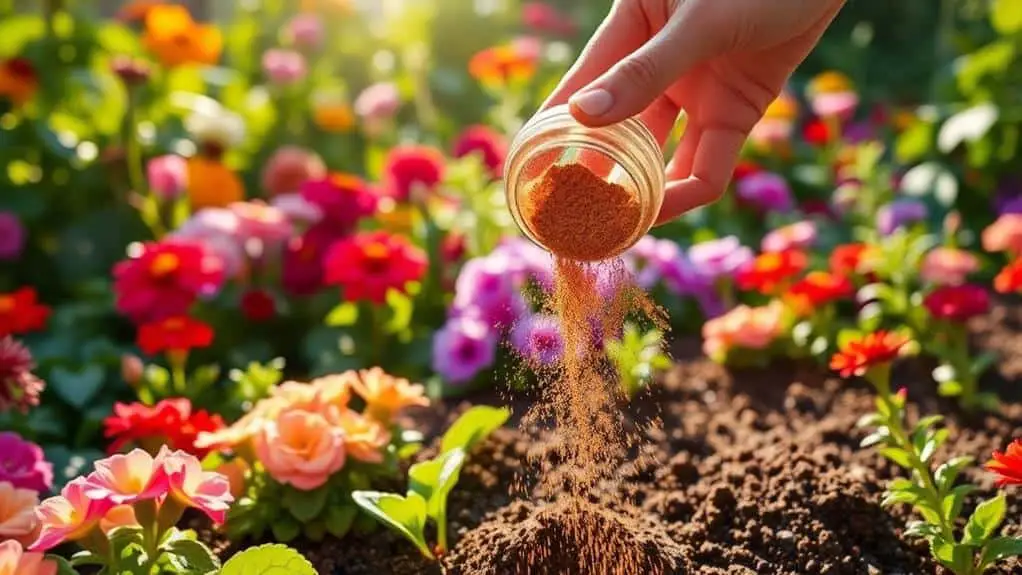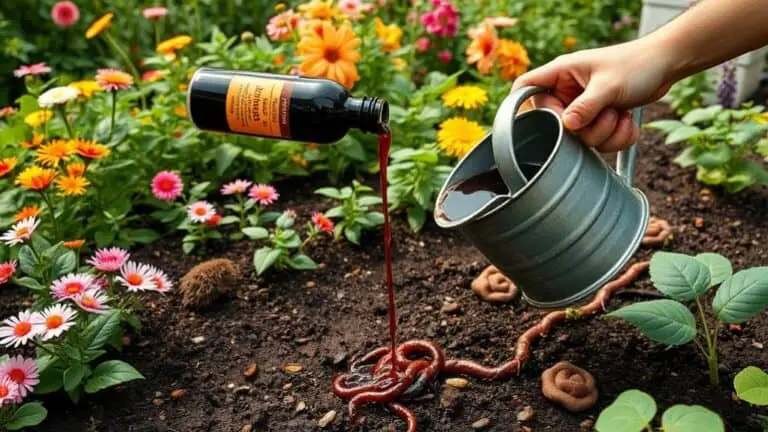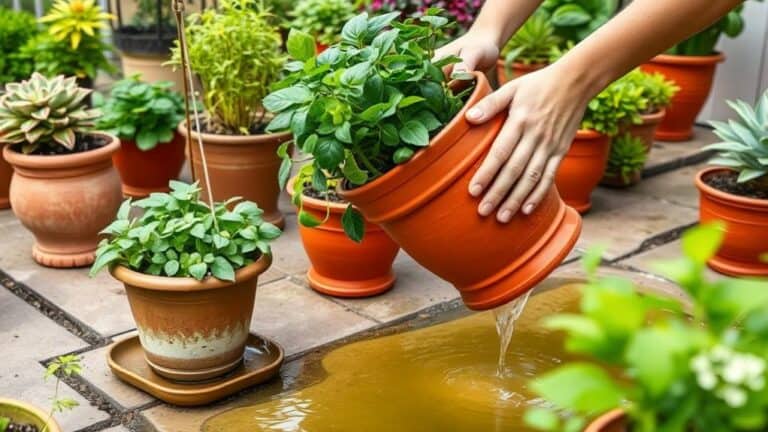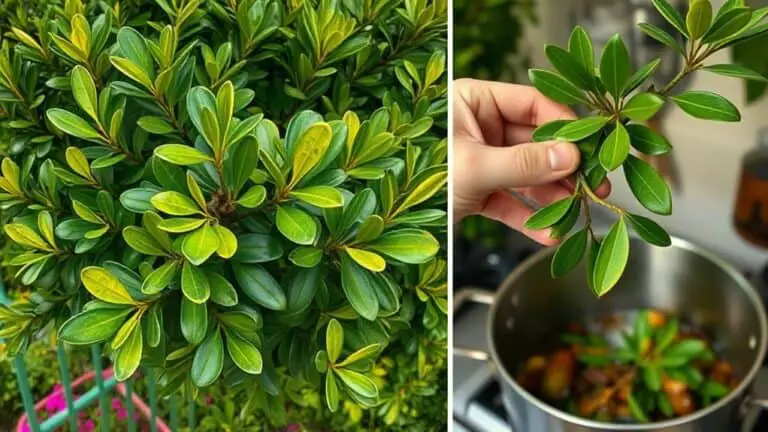How A Sprinkle Of Cinnamon Can Make Your Garden Thrive
Have you ever considered how a common kitchen spice like cinnamon could transform your garden? It's surprising how this aromatic ingredient, often associated with baking, can play a pivotal role in plant health. From preventing fungal diseases to deterring pests, cinnamon offers a natural, eco-friendly solution to many gardening challenges. Its benefits extend to improving soil health and aiding in seedling protection, making it a versatile tool for any gardener. Curious about how exactly cinnamon works its magic and how you can incorporate it into your gardening routine? Let's explore this fascinating topic further.
Benefits of Cinnamon
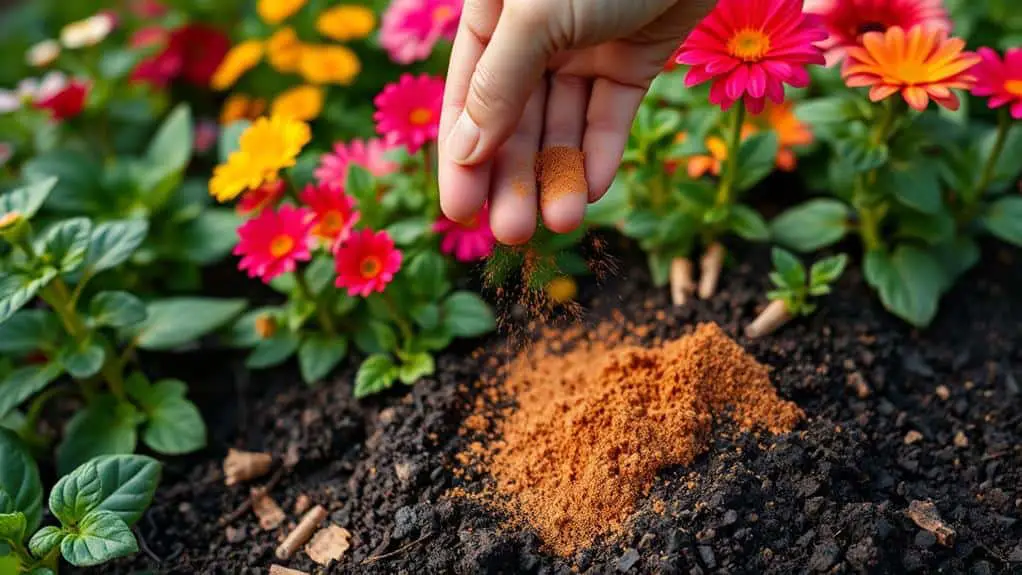
Considering its myriad advantages, cinnamon proves to be a powerful ally for any gardener.
Cinnamon helps boost plant health in multiple ways. Sprinkling it in your garden deters pests like ants and slugs, creating a safer environment for your plants. As a rooting agent, cinnamon encourages faster root development in cuttings, making propagation easier.
Adding cinnamon to your soil promotes beneficial microbial activity, which enhances soil robustness and overall plant health. It's an eco-friendly alternative to chemical fungicides and pesticides, reducing harmful chemical exposure.
Anti-Fungal Properties
Cinnamon's natural antifungal properties make it a powerful ally in the garden.
By sprinkling a little cinnamon on your soil, you can prevent fungal infections like damping-off disease and control unwanted mushroom growth.
It's a simple and effective way to protect your plants and keep them healthy.
Natural Fungicide Solution
One of the most effective natural fungicide solutions for your garden is using cinnamon.
Cinnamon powder, with its natural antifungal properties, can help keep your plants healthy. Simply sprinkle it on the soil to prevent mold and mildew from forming. The key compound, cinnamaldehyde, targets harmful fungi but leaves beneficial microorganisms alone, creating a balanced environment for your plants.
If you already have a fungal issue, you can make a cinnamon foliar spray. Just steep powdered cinnamon in water and apply it to the affected areas. This will help treat existing infections.
Additionally, cinnamon can deter unwanted mushrooms in your potting soil, ensuring ideal growing conditions. Trust me, your garden will thank you for this simple, natural remedy.
Damping-Off Disease Prevention
When it comes to preventing damping-off disease in your garden, cinnamon is a powerful ally. This common issue, caused by soil-borne fungi, can devastate young seedlings.
Luckily, cinnamon's natural antifungal properties can effectively combat this problem. By sprinkling a bit of cinnamon on the soil around your seedlings, you create a protective barrier that stops fungal growth in its tracks.
Using cinnamon not only reduces the incidence of damping-off disease but also promotes healthier plant development. As an eco-friendly alternative to synthetic fungicides, it's perfect for organic gardening.
Research shows that a light dusting of cinnamon enhances seedling health by preventing root rot and other fungal infections. So, next time, don't forget to reach for the cinnamon!
Mushroom Growth Control
If you're battling unwanted mushrooms in your garden, cinnamon can be a game-changer.
Cinnamon in the garden works wonders due to its natural antifungal properties. By sprinkling cinnamon directly on the soil or around plants, you create a protective barrier that stops mushrooms from growing. The essential oils in cinnamon disrupt fungal pathogens' life cycles, keeping your soil healthy and reducing root rot risks.
You can even make a foliar spray with cinnamon and water to tackle existing fungal infections without harming beneficial fungi. A light dusting of cinnamon on topsoil prevents mold growth and boosts plant health by fostering a balanced microbial environment.
Pest Deterrent
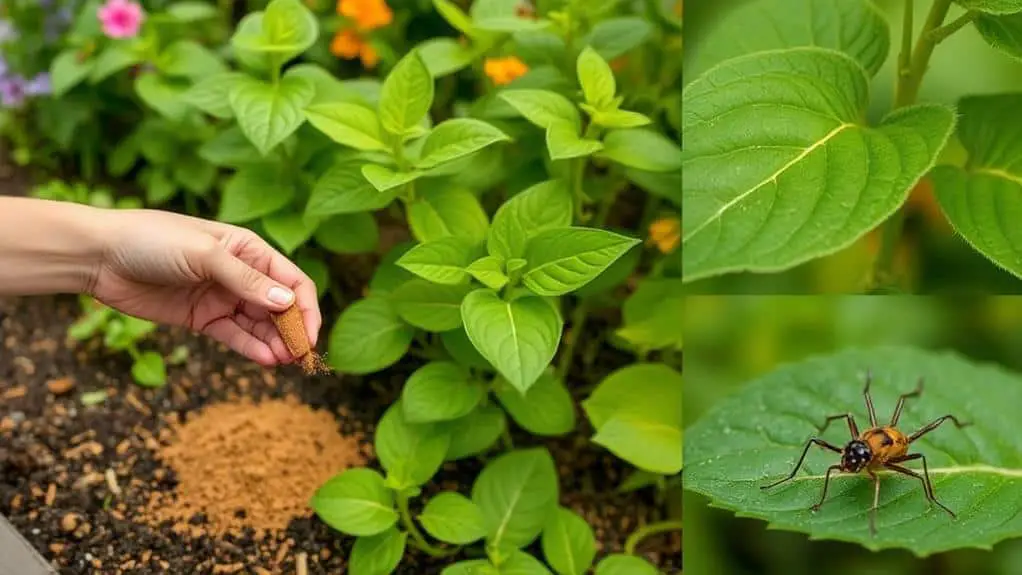
Sprinkling cinnamon around plants creates an effective protective barrier against ants, making it a fantastic natural alternative to chemical repellents.
When using cinnamon for pest management, I've noticed that the scent disrupts ant trails, encouraging them to relocate. This simple method helps reduce infestations without harming children or pets, offering an eco-friendly option.
Cinnamon's antifungal properties also help protect against pest-related issues by reducing fungal growth, which can attract pests like gnats. Additionally, applying cinnamon to the soil maintains healthier soil conditions by reducing excess moisture that pests love.
You'll find that this natural approach is both effective and safe, ensuring your garden thrives without relying on harsh chemicals. Give it a try and see the difference!
Rooting Aid
Cinnamon works wonders as a natural rooting aid, protecting cuttings from fungal infections and promoting healthier root development. When you're propagating new plants, rolling the cut end of the stem in cinnamon will encourage faster and stronger root growth.
The antifungal properties of cinnamon are excellent at preventing damping-off disease, a common issue that affects young cuttings and seedlings.
Using cinnamon as a rooting agent is just as effective as synthetic rooting hormones. It provides a safer, eco-friendly alternative.
Applying cinnamon to plant wounds guarantees they heal quickly and without infection. This simple step can greatly enhance your rooting success rates, allowing your new plants to establish themselves more quickly.
Give it a try; you'll see the difference!
Seedling Protection

Sprinkling a bit of cinnamon around your seedlings can work wonders in keeping them healthy.
It acts as a natural fungicide, preventing damping-off disease, which is a common problem for young plants.
Just be careful not to use it on tomato plants, as it might hinder their growth.
Prevent Damping-Off Disease
When it comes to preventing damping-off disease in seedlings, I've found that a simple, natural remedy can work wonders.
Cinnamon acts as a natural fungicide, effectively stopping the pathogens like Pythium and Rhizoctonia that cause this disease. By sprinkling cinnamon on the soil around your seedlings, you create a protective barrier that prevents fungal growth.
This not only helps combat rot but also promotes healthier root development. The antifungal properties in cinnamon guarantee that your young plants thrive without the risk of disease.
I recommend applying cinnamon at the first sign of trouble or even as a preventive measure. This way, your seedlings can establish strong, resilient root systems right from the start.
Enhance Seedling Health
Taking the next step in nurturing your seedlings, it's important to focus on enhancing their overall health. By sprinkling cinnamon around your seedlings, you create a natural barrier against common threats.
Cinnamon acts as a natural fungicide, protecting young plants from damping-off disease. This disease can be devastating, but cinnamon helps keep it at bay.
Cinnamon also deters mold growth and promotes a healthier growing environment. Its antifungal properties reduce the risk of root rot, ensuring your seedlings develop strong and healthy root systems.
Additionally, a light dusting can control fruit fly populations, which can harm young seedlings. However, remember not to apply cinnamon to tomato plants, as it can inhibit their growth.
Happy gardening!
Foliar Spray Recipe
Creating a cinnamon foliar spray is an effective and natural way to protect your garden from fungal issues and pests.
To prepare the spray, combine 2-3 tablespoons of powdered cinnamon with 1-2 quarts of warm water in a spray bottle. Let it infuse overnight for maximum potency.
The next day, strain the mixture using a sieve or coffee filter to remove undissolved particles that may clog the spray nozzle.
Apply the cinnamon foliar spray to affected areas of your plants twice a week. This will help combat fungal issues, gnats, and flies.
Cinnamon's antifungal properties make it a natural treatment for plant diseases. Always test the spray on a single leaf before using it widely to guarantee there are no adverse effects.
Plant Wound Care
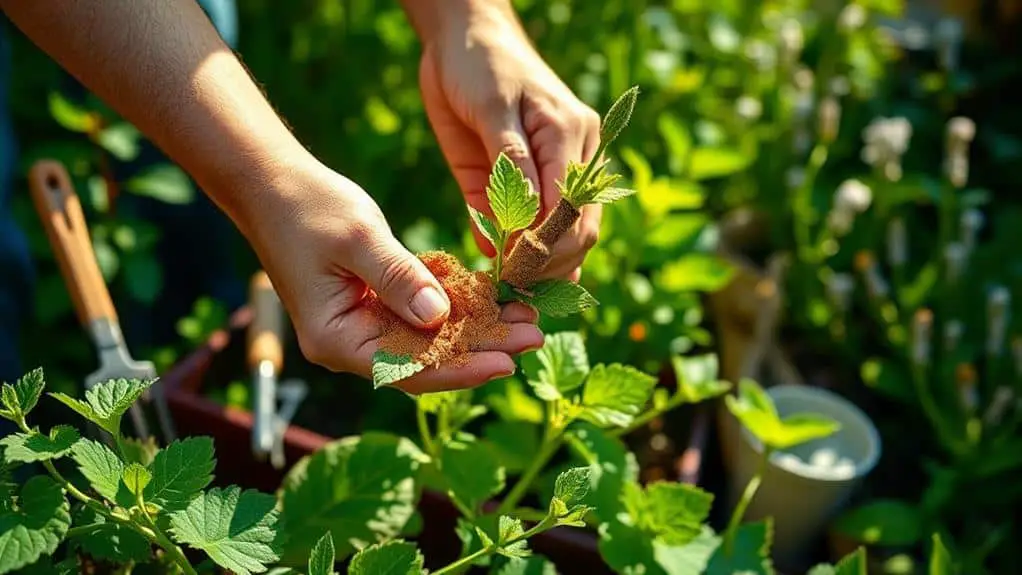
Cinnamon's antiseptic power can transform plant wound care into a more manageable task. When you apply cinnamon to open plant wounds, it acts as a natural barrier against harmful bacteria and fungi. This not only promotes faster healing but also supports overall plant health.
A light dusting of cinnamon on freshly cut areas helps protect your plants from infections. Over time, this simple step can enhance the longevity of your plants and encourage healthier recovery after pruning or injury.
Here's a quick guide:
| Benefit | Description |
|---|---|
| Natural Antiseptic | Fights bacteria and fungi on plant wounds |
| Promotes Faster Healing | Encourages quicker recovery |
| Protective Barrier | Shields cuts from harmful pathogens |
Try using cinnamon in your garden and watch your plants thrive!
Soil Health Improvement
When you incorporate cinnamon into your soil, you enhance microbial activity that supports a healthier ecosystem for plant roots. This soil health improvement is one of the key uses of cinnamon in gardening.
Its antifungal properties help prevent soil-borne diseases like damping-off, which can harm seedlings. By sprinkling cinnamon on topsoil, you create a natural barrier against mold growth, ensuring soil quality remains high.
Additionally, cinnamon deters pests such as ants and fungus gnats, fostering a balanced environment where beneficial organisms can thrive. This leads to better nutrient availability for plants, encouraging stronger growth and resilience against stressors.
Seasonal Gardening Tips
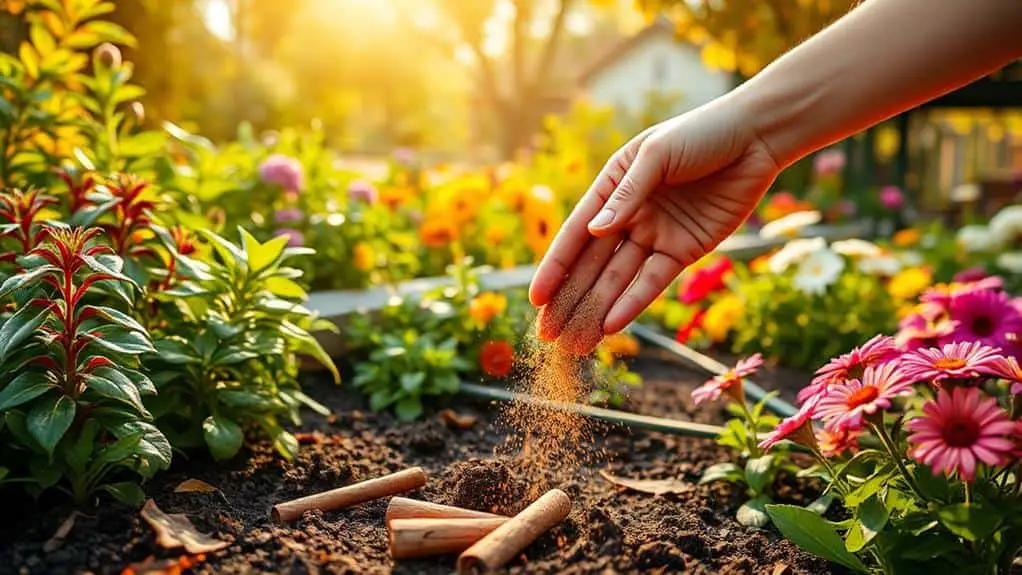
As the seasons change, it's vital to adapt your gardening practices to guarantee your plants thrive year-round.
In your fall garden, try planting fast-growing vegetables like spinach or radishes for a quick harvest before winter. Use row covers to protect your vegetable garden from early frost, extending the growing season.
Crop rotation is important in fall gardening to keep soil healthy and reduce pests, leading to better yields later. Keep an eye on weather patterns to adjust planting schedules and shield sensitive plants from sudden cold snaps.
Also, practice succession planting by staggering your planting dates. This way, you'll enjoy a continuous supply of fresh produce throughout the fall.
With these tips, your garden can flourish in any season.
Recommended Products
When it comes to enhancing your garden with cinnamon, there are some great products to contemplate.
I love using an 18 oz container of cinnamon powder because it's affordable and versatile for pest control and antifungal needs.
Trusted seed companies like SeedsNow, Renee's Garden, and High Mowing Seeds offer seeds that work wonderfully with cinnamon to promote healthier plant growth.
Trusted Seed Companies
Choosing the right seed company can make a world of difference in your gardening journey, transforming your backyard into a thriving oasis.
Trusted seed companies like SeedsNow, Renee's Garden, and High Mowing Seeds offer high-quality seeds that can help your garden flourish.
SeedsNow specializes in organic and heirloom seeds, promoting biodiversity and sustainability.
Renee's Garden provides a carefully curated selection of gourmet vegetable, herb, and flower seeds, along with detailed growing instructions.
High Mowing Seeds supports organic farming practices, ensuring healthy, vibrant crops.
Many of these companies also offer guides to help you choose the best seeds for your local climate and soil.
Cinnamon Powder Options
Let's explore the best cinnamon powder options for your garden. High-quality cinnamon powder can be found in 18 oz packages from various online retailers, ensuring you have enough for gardening.
Opt for Ceylon cinnamon, known for its superior quality and lower coumarin levels, making it safer for both culinary and gardening uses. Always choose organic cinnamon powder to avoid pesticides and chemicals, supporting eco-friendly gardening.
Check local garden centers for bulk options, which are more economical for larger gardens. Finally, consider purchasing from reputable brands that prioritize sustainability and ethical sourcing.
This not only benefits your garden but also supports environmentally-friendly practices, making your gardening journey even more rewarding.
Personalized Garden Services
A well-designed garden is a personal sanctuary, and personalized garden services can make that vision a reality. When you use personalized garden services, you get expert consultations to design and install gardens that match your tastes and local climate.
Trusted seed companies like SeedsNow and Renee's Garden provide high-quality seeds ensuring healthy plants. These services often include affiliate links to reliable tools and supplies, which enhance your gardening experience.
Expert advice is invaluable. Professionals can guide you on the best practices, like how to use cinnamon to deter pests or prevent fungal problems.
Personalized packages might also include helpful resources, such as eBooks and newsletters, offering ongoing tips and seasonal strategies. With these services, your garden will truly thrive.
Frequently Asked Questions
Can I Sprinkle Cinnamon in My Garden?
Absolutely, you can sprinkle cinnamon in your garden. I've found its benefits remarkable for garden health. Cinnamon works as a natural fungicide, deters pests, enhances soil vigor, and promotes quicker root development for cuttings.
Which Plants Don't Like Cinnamon?
I've found that plants like tomatoes, basil, mint, and ferns don't respond well to cinnamon. Their sensitivity to cinnamon toxicity can cause stunted growth or health issues. Always test it on a small area first.
Does Sprinkling Cinnamon on Plants Keep Bugs Away?
Yes, sprinkling cinnamon on plants keeps bugs away. I've found cinnamon benefits my garden as a natural pest deterrent. It repels pests like ants and fungus gnats, ensuring healthier plants without harmful chemicals. Try it!
How to Use Cinnamon on Tomato Plants?
When using cinnamon on tomato plants, I recommend applying it sparingly in the soil for pest prevention. Confirm the plants are well-established. This method allows you to enjoy cinnamon benefits without inhibiting tomato growth.
Conclusion
So, go ahead and give cinnamon a try in your garden. It's a simple step that can make a big difference. With its antifungal properties, pest deterrent abilities, and support for strong roots and healthy seedlings, cinnamon is a gardener's friend. Just sprinkle a bit on your soil and watch your plants thrive. You'll feel confident knowing you're using a safe, natural method to help your garden flourish. Happy gardening!

